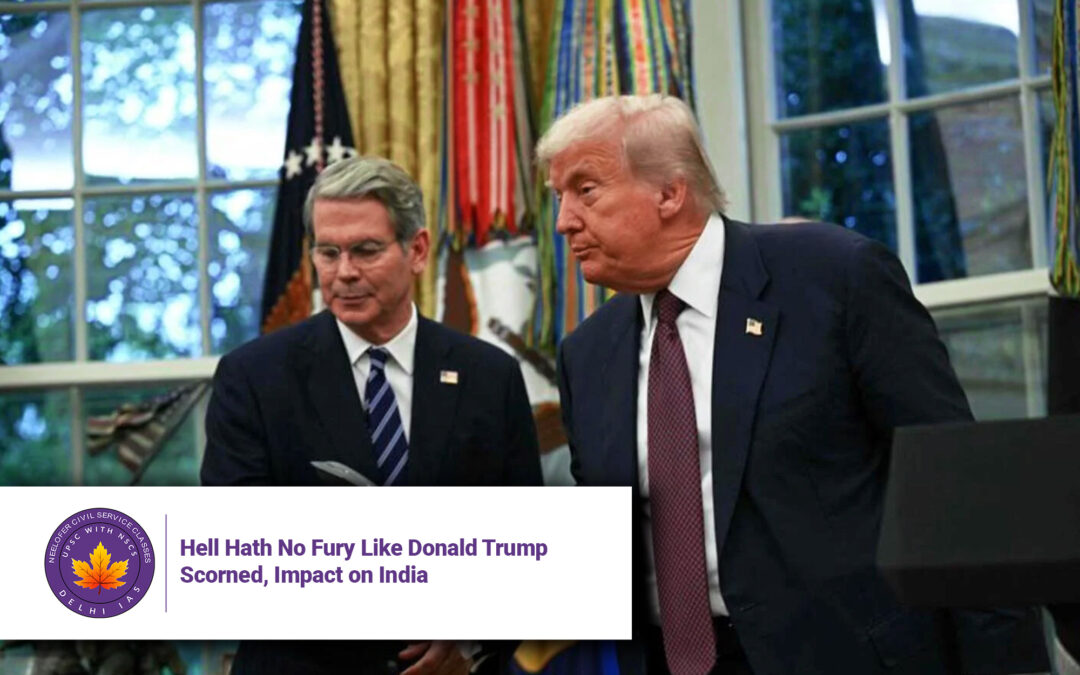Hell Hath No Fury Like Donald Trump Scorned, Impact on India
Why in News
The global trade and diplomatic community has been shaken by recent actions and statements from former U.S. President Donald Trump. He has imposed 50% tariffs on India, suspended trade talks until tariff disputes are resolved, and expressed little concern for the effect of these measures on the Indian economy. Trump’s administration has also criticized India’s purchase of Russian oil, threatened secondary sanctions, and encouraged European countries to impose penalties on India. Meanwhile, in a strikingly different approach, Trump has extended favorable treatment toward Pakistan, praising its counter-terrorism role and imposing only limited tariffs.
This dual strategy—severe restrictions on India and leniency toward Pakistan—has raised concerns in India’s policy circles. It also raises questions about America’s broader Indo-Pacific strategy, its geopolitical calculations regarding China and Russia, and the implications for India’s economy, trade, and security.
Introduction
Donald Trump’s foreign policy and trade stance has often been described as unpredictable, transactional, and bluntly America-first. His administration’s actions toward India reflect this approach. India, once hailed as a strategic partner in the Indo-Pacific, now finds itself under immense pressure from Washington due to its ties with Russia and trade practices that Trump deems unfair.
Trump’s remarks have been sharp: he has dismissed concerns about India’s economic slowdown, openly mocked its dependence on oil imports, and warned of escalating tariffs. Peter Navarro, Trump’s trade advisor, has labeled India’s Russian oil imports a “threat to America’s national security.” To worsen matters, U.S. Treasury Secretary Scott Bessent has indicated that if Trump’s talks with Vladimir Putin collapse, India could face additional tariffs and sanctions.
At the same time, Trump’s seemingly favorable treatment of Pakistan—despite its chequered history with terrorism—marks a striking shift in American policy priorities. By inviting Pakistan’s military leadership for talks, praising its “success in containing terrorism,” and signaling openness to oil trade with Islamabad, Trump appears to be using Pakistan as a counterweight to India.
These developments put India in a difficult position: caught in the crossfire of America’s rivalry with Russia and China, yet punished more harshly than other countries importing Russian oil, such as China, Turkey, Japan, Hungary, and Slovakia.
Key Issues and Background
-
Tariff War with India
-
Trump has slapped 50% tariffs on Indian goods and suspended trade talks until disputes are resolved.
-
Secondary tariffs may be imposed if U.S.-Russia talks fail.
-
Trump has demanded that Europe follow suit with similar penalties on India.
-
-
India’s Russian Oil Imports
-
India continues to buy discounted Russian oil after the Ukraine war.
-
Trump sees this as undermining U.S. sanctions and benefiting Moscow.
-
Hypocrisy charge: the U.S. itself continues to import certain Russian minerals, chemicals, and fertilizers, yet criticizes India for oil imports.
-
-
Pakistan’s Preferential Treatment
-
Trump has only imposed 19% tariffs on Pakistan.
-
He praised Pakistan as a “phenomenal partner” in counter-terrorism.
-
Pakistan’s military leadership was hosted in Washington, fueling speculation about a new U.S.-Pakistan alignment.
-
-
Contradictions in U.S. Policy
-
Trump has not penalized China, Turkey, Japan, Hungary, or Slovakia—all major importers of Russian oil.
-
He seems to single out India disproportionately.
-
This raises doubts about the consistency and fairness of U.S. foreign policy.
-
-
Impact on Quad and Indo-Pacific Strategy
-
India is a key partner in the Quad alliance (India, U.S., Japan, Australia).
-
Trump’s actions undermine trust and weaken collective Indo-Pacific strategy against China.
-
If India is sidelined, Beijing gains strategic space.
-
Specific Impacts or Effects
-
Economic Impact on India
-
50% tariffs significantly reduce the competitiveness of Indian exports to the U.S.
-
Sectors such as textiles, pharmaceuticals, IT services, and engineering goods are directly hit.
-
Suspension of trade talks jeopardizes future agreements like a U.S.-India free trade deal.
-
-
Geopolitical Impact
-
India risks being marginalized in U.S. strategic thinking, while Pakistan gains renewed relevance.
-
China may benefit if India drifts away from the U.S. and leans more on Russia.
-
India’s role in the Indo-Pacific “Quad” could weaken if trust between Washington and New Delhi erodes.
-
-
Diplomatic Fallout
-
Strained India-U.S. ties could affect defense deals, technology transfers, and intelligence sharing.
-
India’s balancing act between the U.S. and Russia becomes harder to maintain.
-
Europe’s potential imposition of secondary sanctions would further isolate India.
-
-
Domestic Repercussions in India
-
The Indian economy, already battling slowdown, faces more uncertainty.
-
Political debates will intensify on whether India should realign foreign policy away from U.S. dependency.
-
Public opinion may grow more skeptical of American intentions.
-
Challenges and the Way Forward
-
Balancing U.S. and Russia
-
India depends on Russia for energy, defense equipment, and strategic support.
-
But U.S. remains a vital partner in technology, trade, and geopolitics.
-
India must carefully balance these ties without alienating either side.
-
-
Reinforcing Quad Unity
-
India should emphasize its strategic role in the Indo-Pacific to counter China.
-
Diplomatic engagement with the U.S., Japan, and Australia is necessary to prevent fragmentation of Quad.
-
-
Economic Diversification
-
India must expand exports to other markets (Europe, Africa, Southeast Asia) to reduce dependency on the U.S.
-
Domestic reforms to boost competitiveness are crucial.
-
-
Diplomatic Engagement with Europe
-
India needs to proactively engage with EU leaders to prevent the imposition of secondary sanctions.
-
Highlighting hypocrisy in U.S. policy—where other importers of Russian oil are untouched—could help India’s case.
-
-
Long-Term Strategic Autonomy
-
India should pursue an independent foreign policy that maximizes national interests.
-
Strengthening ties with multiple power centers—U.S., Russia, EU, Japan, ASEAN—ensures strategic flexibility.
-
Conclusion
Donald Trump’s hardline stance on India reveals the challenges of navigating great power politics in an era of shifting alliances. By punishing India while sparing other importers of Russian oil, Trump has raised doubts about American reliability as a partner. His tilt toward Pakistan adds to Indian concerns, creating a sense of betrayal in New Delhi.
The road ahead for India is complicated: it must preserve relations with the U.S. while continuing its energy partnership with Russia. At the same time, India must assert its strategic importance in the Indo-Pacific to ensure it is not sidelined.
As Karan Thapar aptly noted, “Hell hath no fury like a Trump scorned.” For India, the task is to ensure it does not become collateral damage in America’s battles with Russia and China.
5 Questions and Answers
Q1. Why has Donald Trump imposed 50% tariffs on India?
A1. Trump argues that India’s imports of Russian oil undermine U.S. sanctions and threaten American national security. He has also suspended trade talks until disputes are resolved.
Q2. Why is Trump treating Pakistan differently from India?
A2. Trump has imposed only 19% tariffs on Pakistan and praised it as a counter-terrorism partner. This may reflect a U.S. attempt to re-engage Pakistan strategically, especially for regional security.
Q3. How does Trump’s policy affect India’s role in the Indo-Pacific Quad?
A3. By sidelining India, Trump weakens Quad unity against China. If India’s trust in the U.S. declines, the Indo-Pacific strategy loses effectiveness.
Q4. Is the U.S. being hypocritical about Russian imports?
A4. Yes. While criticizing India, the U.S. itself continues to import Russian minerals and chemicals. Other countries like China, Turkey, Hungary, Slovakia, and Japan also import Russian oil but have not faced similar penalties.
Q5. What should India do to counter U.S. pressure?
A5. India must diversify export markets, strengthen ties with Europe and Asia, maintain balanced relations with both the U.S. and Russia, and reinforce its role in Quad to safeguard national interests.







